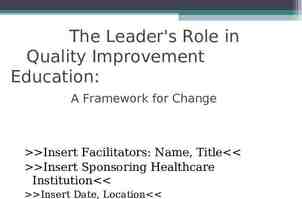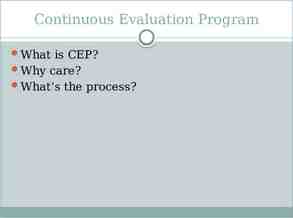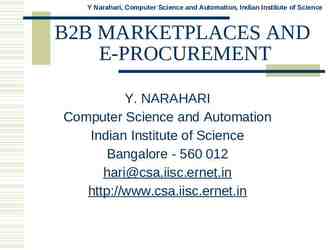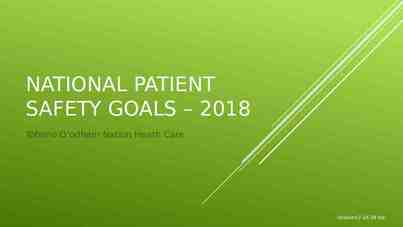PROCUREMENT AT MSU DENVER
15 Slides2.52 MB

PROCUREMENT AT MSU DENVER

A SHORT HISTORY By statute, all of higher ed used to be under the control of the State Controller and the State’s fiscal and procurement rules. The state’s rules were written for state agencies in general, so frequently they didn’t address higher ed’s needs very well. Senate Bill 10-003 modified CRS 24-30-202 to authorize the University to opt out of State fiscal rules, provided we created our own. It also allowed us to opt out of the State’s procurement rules. In 2011, we opted out of both the state’s fiscal and procurement rules and wrote our own.

DEVELOPING OUR RULES For the most part, we modeled our Fiscal Rules on the State’s rules. No point re-inventing the wheel. The primary changes were related to transferring authority, where possible, from the State Controller to our own officials. As things progressed, we started to make updates that worked better for us, mostly around encumbrance requirements, exemptions from certain rules, contract requirements, etc. For the Procurement Rules, we changed quite a lot to make the rules less restrictive and the process less cumbersome. As a University philosophy, we believed that, as much as possible and allowable, departments should be able to determine the best use of their funds. We don’t want to be financial baby-sitters. VERY IMPORTANT – no matter what, we still have to follow any statutory requirements.

FISCAL RULES The Fiscal Rules cover everything financial: CHAPTER 1: ACCOUNTING CHAPTER 2: DISBURSEMENT Chapters 2 and 3 relate to purchasing. CHAPTER 3: UNIVERSITY CONTRACTS CHAPTER 4: PROJECTS CHAPTER 5: TRAVEL CHAPTER 6: CASH CHAPTER 7: BUDGET CHAPTER 8: REPORTING CHAPTER 9: PAYROLL Chapter 2 is what you need to make a purchase: When/what kind of purchase is allowable? When is an encumbrance required? What constitutes an emergency purchase? What backup do you need to provide? What terms and conditions are required, and what can we absolutely not agree to? Chapter 3 relates to formal, long-form contracts: When they are required What terms they must contain and what is prohibited What approvals are required

PROCUREMENT RULES The main focus of the Procurement Rules is how we make a purchase. Ensure fair competition for purchases Code of Ethics Solicitation methods – when required, what kind, what dollar limits How to handle disputes related to a solicitation But who has time to read through and memorize all of these rules?

WHAT DO YOU REALLY NEED TO KNOW ABOUT PURCHASING? Stars to Steer By: It needs to be for the benefit of the University. It should not be for personal gain, ie no conflict of interest. Vendors and contractors should be given a fair opportunity to compete for the purchase. Prices should be fair and reasonable. Don’t sign any vendor agreements

WHAT ARE YOU BUYING? Goods and services have different bid limits Goods are discretionary up to 25,000 Services are discretionary up to 50,000 Awarded vendors Can be awarded by the State or by the University A solicitation has already been done, and these vendors/contractors were awarded. Some are mandatory (office supplies, copiers, furniture, etc.) and some are permissive. Don’t sign anything! (Unless the Contracts office says it’s ok.) Only a few people have authority to bind the University to a legal contract. There are many terms and conditions that are required or prohibited. Prohibited ones can place a significant liability risk on the University that might not be covered by our insurance. One of the Fiscal Rules says that if you sign something you shouldn’t, it can become your personal liability. Always attach any contract or agreement you get from a vendor/contractor to your SPO or Purchase Requisition or send it directly to the Contracts office for review. Do not sign it unless the Contracts office says you can.

HOW MUCH DOES IT COST? The cost of the purchase will generally determine the type of documentation required and whether a solicitation is necessary. Under 10K Corporate card - if the vendor accepts it and there is no additional fee for using it and no additional reason for using an SPO, Non-employee Personal Services (NPS) form - generally for one-time services performed by an individual, such as models or speakers, Special Purchase Order (SPO) - just like a PO but for small dollars and handled internally, rather than through AHEC, Payment Request – formerly known as a check request, used to have AP issue a check for payment when not paying by corporate card and an SPO or NPS is not required. Over 10K – Requires a Purchase Order (PO) or formal contract Bid limits - 25K goods; 50K services Grant-funded purchases – Must follow the Uniform Guidance Quotes for services between 25K- 50K, all other rules apply If something is specifically detailed in the grant, it does not need to be bid Sole Sources – It’s probably not.

PAYMENT METHODS Payment methods are separate from procurement methods. For instance, you may be required to have a PO and still pay invoices card. Corporate card – Departments and individuals may have a corporate card and may pay invoices directly. Note that vendors frequently charge a fee for using a credit card. In that case, you should send the invoice to AP to pay by check. Check/ACH – AP receives the invoice and pays by check or ACH. with a corporate They can also pay by wire for international vendors. Third party processors – The University restricts use of these payment methods. PayPal and Square – Yes Both charge the processing fee back to the vendor and include vendor information in the charge description VENMO and anything else – NO VENMO charges the processing fee to us and does not provide vendor information in the charge description. For similar reasons, you may not use any other payment portals, unless they have been approved by the Controller’s office.

RESOURCES Please note that the Fiscal Rules are Purchasing manual are currently being updated. New versions will be posted soon. Fiscal Rules: https://www.msudenver.edu/controller/ Procurement Rules: https://www.msudenver.edu/wp-content/uploads/2021/12/Procurement-Rules.pdf Purchasing Manual: https://www.msudenver.edu/wp-content/uploads/2021/09/PurchasingManualUpdated09-2017-2.pdf Purchasing Forms: https://www.msudenver.edu/controller/accounts-payable-corporate-cards-and-travel/downloadableforms/

WORKDAY FINANCE OVERVIEW

REPORTING Workday has predeveloped as well as customizable reports, that will not only help with traditional budgeting responsibilities, but when integrated with the student system will allow cost reports to be created to help answer operational questions and support strategic decisions.

FULLY INTEGRATED SYSTEM You no longer have to log into one system to submit credit card receipts, another system to see the transaction, and a separate system to run reports. We will be moving out of Chrome River for both credit card and travel expense management. Everything will be handled in Workday and transactions will update in real time.

INTEGRATED WORKFLOWS Fully integrated workflows, so no more email exchanges for procurement and invoice approvals. Fully integrated purchasing system, so purchase requisitions can be created in the system and converted into a purchase order, avoiding lost emails and redundant data entry. No more emailing purchase requisitions and wondering where they are! Approvals are automatically routed within the system and trackable in real time. System permissions and approving authorities are tied to positions, not names, so you no longer have to request access for new employees. Permissions are set up in Workday, so changes are automatically and immediately updated.

ADDITIONAL INFORMATION For additional information about Workday, you can go to the University’s Workday Webpage: https://www.msudenver.edu/workday/






